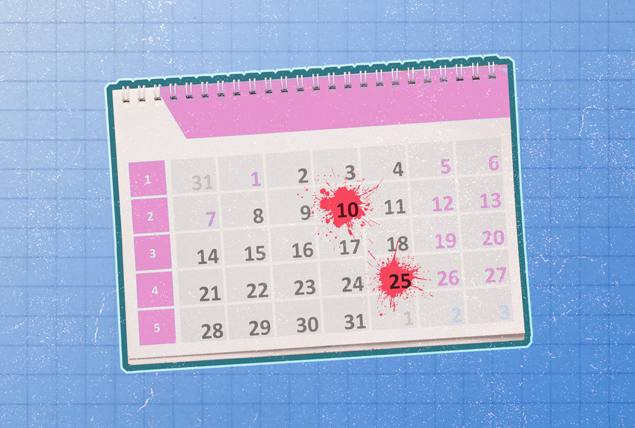Is Getting Your Period Twice in One Month Normal?

As if the discomfort and unpleasantness of having your period once a month for decades weren't enough, some unfortunate souls may experience menses more often.
Plenty of external factors can make your cycle go a little haywire now and then. Stress, sleep quality, nutrition and exercise intensity can all cause hormones to fluctuate, leading to irregular menstrual cycles. These changes can even cause you to miss a period, according to Cleveland Clinic.
Here's what experts say about the causes and whether you should be concerned and, no, your menstrual cycle isn't in sync with the moon.
What's a 'normal' period anyway?
You may have learned in health class that a "normal" cycle length is once every 28 days, but that just isn't the reality for lots of people. One person's normal could be 30 days, while it could be 27 for others. And some people may experience a different length of cycle each month.
Normal is relative, as cycles vary from person to person. A typical period comes every 25 to 35 days and lasts for two to seven days for most people, according to Mayo Clinic. Some people get their period like clockwork every month, while others have a variation: 27 days one month, 30 days the next month, 29 days the following month.
"Approximately 25 percent of people with periods will have irregular cycles," said Lora Shahine, M.D., an OB-GYN at Pacific NW Fertility in Seattle. "If the bleeding occurs more frequently than every 21 days, this is called polymenorrhea."
Polymenorrhea is considered a form of abnormal vaginal bleeding. On the other end of the spectrum, other types of abnormal vaginal bleeding are cycles longer than 37 days (oligomenorrhea) or failure to menstruate for 90 days or more (amenorrhea). Some people may also experience bleeding or spotting between their periods, or menorrhagia.
Regardless of your typical cycle, if the frequency or conditions of your period suddenly change, it's a good idea to speak to your OB-GYN or other healthcare provider.
"Anytime there is irregular bleeding or concerns about someone's menstrual cycle, it is best to speak with a doctor to rule out any medical issues," said Jillian Amodio, L.M.S.W., a social worker, sex educator and author based in Maryland.
Common reasons for getting more than one period a month
Plenty of internal and external elements can mess with your cycle. These factors could result in an extended, shorter, heavier, or more or less frequent period.
Here are a few reasons you may get your period twice in one month:
- Hormonal birth control or other medications
- Hormonal and ovarian changes during perimenopause
- Endocrine disorders, such as polycystic ovary syndrome (PCOS)
- Thyroid disorders from an over- or underactive thyroid
- Bleeding disorders, such as Von Willebrand disease
- Extreme dieting or exercise
- COVID-19 vaccination may temporarily increase the length of menstrual cycles
- Stress
- Endometriosis, which causes endometrium-like tissue to grow outside of the uterus
- Uterine fibroids, or noncancerous growths in the uterus that can cause bleeding
- Insufficient vitamin D intake
Could polymenorrhea cause other problems?
People who experience short, frequent periods may find it more difficult to get pregnant because ovulation or the luteal phase, when the body prepares for pregnancy by thickening the uterine lining, may be affected.
It could be more difficult to track ovulation and pinpoint peak conception times. A shortened luteal phase could prevent a fertilized egg from attaching to the uterus properly. This shorter phase may be caused by a progesterone deficiency, which research suggests could carry an elevated risk of endometrial cancer.
People with polymenorrhea may be at risk for iron deficiency and anemia, particularly if the more frequent flow is heavy.
Is treatment needed?
Whether you need treatment depends on the cause. Many different factors, including stress, could be at play. A small study from 2018 found an association between stress and period problems.
"Irregular menstrual cycles can be a sign of underlying health issues and should signal an evaluation with your doctor," Shahine said. "Your doctor can ask questions and order anatomy tests like ultrasounds and blood tests for hormone levels that can help determine the cause for you."
A patient's fertility timeline and goals should be considered, as some treatments, such as hormonal birth control, may impede the ability to get pregnant. Sometimes lifestyle changes, like stress management or improved nutrition, can get cycles back on track.
Regardless, experts advise seeing a physician to suss out cycle problems.
"Our health should always be taken seriously, and we should not worry about being an 'inconvenience' or 'overreacting,'" Amodio said. "If we feel something is off, then it is best to get checked out."
The bottom line
If you experience more than one period in a month, it's worth contacting your doctor. Although it may not be cause for alarm, it is important to determine the cause and figure out if it's normal for you or the sign of an underlying health condition.
Do you need to find a new doctor? Giddy Telehealth provides an easy-to-use portal with access to hundreds of healthcare professionals. Find a healthcare provider in many specialties. Many doctors offer same-day appointments or video consultations.


















